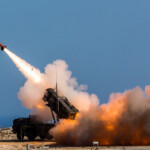Iran issued veiled threats but did not immediately respond to pre-dawn Israeli airstrikes that left two soldiers dead -– as the US said it was “ready” to back up Israel if Tehran issued its own retaliation.
“Iran has the right and duty to defend itself against foreign acts of aggression,” the Iranian Foreign Ministry said Saturday. A semi-official Iranian news agency vowed a “proportional reaction” to the Israeli strikes.
The hardline response came hours after Israel launched a retaliatory strike against Iran, weeks after Tehran’s own missile barrage on the Jewish state.
Despite the fiery statement, sources told the Times of Israel that there was no immediate response from Iran in the works.
President Biden told reporters on Saturday that he hoped the measured attack marked “the end” of direct aggressions between Iran and Israel – but a US source told Israeli public broadcaster KANN News that Washington was “ready” to support Israel in the event of an Iranian response.
“However, we do not want to see this happen, this should be the end point for the direct exchange of fire between Israel and Iran,” the source said.
The Israeli Air Force carried out the “precise strikes” on military targets, including drone and ballistic missile manufacturing and launch sites, as well as air defense systems – but did not strike any civilian centers, the Times of Israel reported.
One of the targets was a Russian-made S-300 air defense of Imam Khomeini International Airport, according to The New York Times.
The wave also hit missile and drone manufacturing sites that were used in Iran’s direct attacks on Israel on April 14 and Oct. 1, the Times of Israel said.
Israel did not hit Iran’s “crown jewels,” or nuclear sites, The Telegraph noted – perhaps in part due to pressure from US officials seeking to avoid an all-out war in region.
On Saturday afternoon, the IDF released a video and photos of F-15 and F-16 fighter jets en route to carry out the strikes, the Times of Israel reported.
The images showed four female navigators with their faces obscured as they prepared to take off.
The navigators were a small part of the larger operations, which reportedly included dozens of Israeli Air Force aircraft, including fighter jets, refuelers, and spy planes.
Iran claimed its air defenses successfully countered the Israeli strikes. The state news agency Tasnim said four soldiers were killed and some locations suffered “limited damage.”
The first reports of explosions near Tehran came around 2:15 a.m. local time.
The Israel Defense Forces released a statement confirming its attack in response to “months of continuous attacks from the Iranian regime against the State of Israel.”
The strike on Iran represented “nothing more than a fraction” of Israel’s true capabilities, opposition National Unity party chairman and former war cabinet member Benny Gantz boasted.
“The campaign is far from over,” he added.
“We must continue persevering in the efforts to bring our hostages home, replace the Hamas regime, and continue to degrade Hezbollah’s capabilities to create a new reality on our northern border that will enable our citizens to return home and live in safety.”
Relations between Israel and Iran have grown increasingly tense in the 12 months since Hamas’ Oct. 7 terror attack, which spawned the Israel-Hamas war in Gaza and the conflict with Hezbollah in Lebanon.
Iran backs both terror organizations in their fights against Israel.
Israel notified the US before striking, but Washington was not involved in the operation, a US official told Reuters.
The US distanced itself from the strikes against Iran in its statement on the mission, but added that it urged Iran to “cease its attacks on Israel so that this cycle of fighting can end without further escalation.”
Other regimes in the Middle East condemned Israel’s actions, citing anxieties over escalation in the region.
Saudi Arabia – which had been inching towards better relations with Israel before the war – condemned the bombardment as a violation of Iranian sovereignty and international law.
The Taliban in Afghanistan accused Israel of attempting to “aggravate violence…which further complicates and intensifies the unfavorable situation in the region.”
Also on Saturday, Hezbollah fired rockets on Israeli forces near the outskirts of Aita al-Shaab in southern Lebanon.
The terror group said it also launched drones against an Israeli air base south of Tel Aviv.
By mid-afternoon local time, Hezbollah had also fired about 80 rockets at northern Israel, according to an IDF tally.
- Three Lebanese journalists from Al-Manar TV and Al Mayadeen TV were killed Friday in an Israeli airstrike on a building known to be housing reporters, witnesses told the BBC.
- On Saturday, Israel shared images of four truck-mounted rocket launchers it seized during operations in Lebanon this week.
- Israel continued to bombard the Gaza Strip over the weekend, including an onslaught in Gaza City.
- Israel forces also reportedly withdrew from the Kamal Adwan Hospital in northern Gaza following a counter-terror operation Friday.
With Post wires







